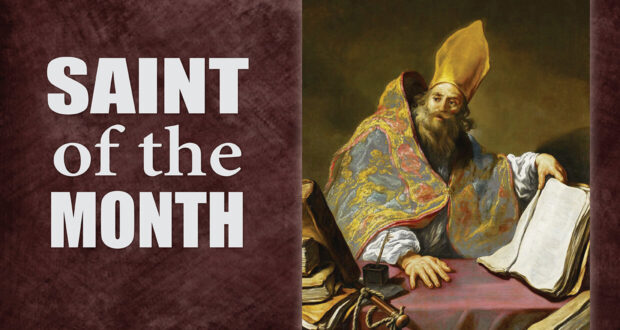Summary
Defender of orthodoxy and champion of justice, Saint Ambrose is a timely reminder to stand firm in our faith when ever-changing events rise to greet us.Saint Ambrose, Doctor of the Church, was a man of unwavering faith who left an indelible mark on the Christian Church and Western civilization. His life was a tapestry woven with threads of political intrigue and theological brilliance. Born around 340 AD in Trier, Gaul (modern-day Germany), Ambrose was raised in a prominent Roman Christian family. His father, also named Ambrosius, was the Praetorian Prefect of Gaul.
Ambrose followed in his father’s footsteps, pursuing a career in law and administration. He rose through the ranks, becoming the governor of Liguria and Emilia, with his seat in Milan around 370 AD.
A Child Will Lead Them
In 374 AD, the Bishop of Milan died, leaving the city’s Christian community deeply divided. Arianism, a nontrinitarian doctrine, held sway among some, while others affirmed the divinity of Christ. Ambrose, known for his fairness and wisdom, was called upon to preside over the election of a new bishop. As he addressed the crowd, a child’s voice cried out, “Ambrose, bishop!” The crowd took up the cry, and despite his protests, he wasn’t even baptized at the time, Ambrose was thrust into the episcopacy.
This unexpected turn of events marked a profound shift in Ambrose’s life. Within a week, he was baptized, ordained, and consecrated bishop. Embracing his new role, he immersed himself in theological studies, drawing inspiration from the Scriptures.
Ambrose quickly established himself as a champion of orthodoxy, defending the Nicene Creed against Arianism and other heresies. He engaged in vigorous debates, wrote influential treatises, and fearlessly confronted emperors who sought to undermine the Church’s teachings. His eloquence and intellect earned him the title “Doctor of the Church.”
Ambrose was also deeply concerned with the plight of the poor. He fearlessly challenged the powerful, including Emperor Theodosius I, whom he excommunicated for ordering the massacre of Thessalonians. This act demonstrated Ambrose’s belief in the Church’s authority to hold even emperors accountable.
Ambrose’s influence extended to the realm of music. He introduced hymnody into Western worship, composing hymns that are still sung today. He also shaped the development of liturgical chant, known as Ambrosian chant, which became a cornerstone of Western sacred music.
Mentor to Augustine
His impact on individuals was equally profound. He served as a mentor to Augustine of Hippo, guiding him towards conversion and baptism. Augustine, one of the most influential theologians in Christian history, credited Ambrose with playing a pivotal role in his spiritual journey.
Ambrose died in 397 A.D., leaving behind a legacy of intellectual brilliance and pastoral compassion. He is remembered as a defender of orthodoxy, a champion of justice, and a shepherd who guided his flock with wisdom and love. His writings continue to inspire and challenge Christians today, reminding them of the importance of standing firm in their faith and living lives of integrity and service.
His feast day is December 7th.
Saint Ambrose. pray for us!
Download the free Saint of the Month poster designed by Emily Prause using the button below. You can pin it to your classroom wall or place it on your refrigerator to help your children learn more about Saint Ambrose.
Download Printable Saint PageClick here for more Saint of the Month posters!

 Seton Magazine Catholic Homeschool Articles, Advice & Resources
Seton Magazine Catholic Homeschool Articles, Advice & Resources
